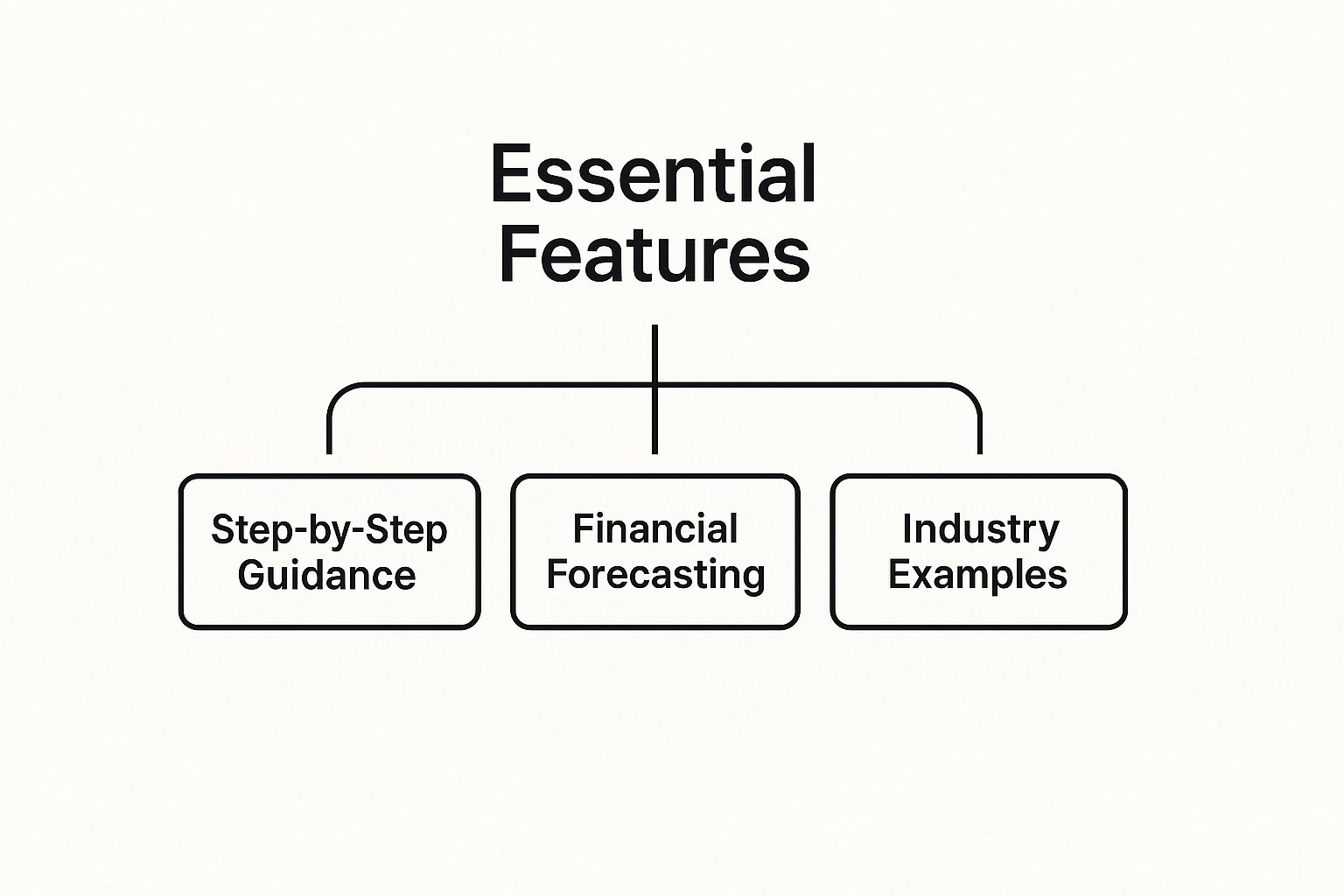Let's be honest, staring at a blank page when you're supposed to be writing a business plan is terrifying. That brilliant idea bouncing around in your head suddenly feels impossible to capture. This is exactly where an online business plan creator comes in, especially for small business owners and entrepreneurs.
Think of it less as a template and more as a seasoned mentor guiding you through the process, one step at a time. It breaks down intimidating sections like financial projections and marketing plans into manageable, question-based steps. For a small entrepreneur, this structured approach is a game-changer for building a roadmap, securing funding, and defining a solid business model.
Turn Your Big Idea Into an Actionable Strategy
Every great small business starts as a spark of an idea, but you need more than just a spark to build a fire. You need a real-world roadmap. An online business plan creator acts as your digital co-pilot, turning the overwhelming task of writing a business plan into a guided journey.

You simply plug in your destination—your goals and vision—and the tool maps out the most effective route. It prompts you with the right questions about your customers, your operations, and your finances. This guided process is a lifeline, especially for solo entrepreneurs who don't have a formal business degree but have plenty of passion and industry knowledge.
From Vision to Viability
A powerful vision is the heart of your small business, but it's the business plan that gives it a backbone. It's what translates your "what if" into a concrete, measurable framework that can attract a small business loan and guide your daily decisions.
The process of building the plan forces you to get brutally honest about every part of your business. An online creator structures this critical thinking, making sure you don't miss the details that prove your business has legs. The final document isn't just an outline of your goals; it's a compelling argument that your concept is truly viable. Before you even get that far, it’s smart to validate your idea with a feasibility study, a crucial step to ensure you’re building on solid ground. You can learn more by exploring our in-depth guide: https://growth-grid.ai/docs/feasibility-study.
A well-crafted plan does more than just help secure a loan; it becomes your North Star for measuring performance. A recent study even showed that small businesses with a formal plan grow 30% faster than those without one.
Building Your Foundational Documents
A business plan creator online is your best ally for developing the core documents that will define your small business's future. It helps you articulate not just what you do, but how you'll win. This means clearly defining your business model, identifying your revenue streams, and creating a marketing plan that actually connects with customers.
These platforms are designed with small business owners and solo entrepreneurs in mind and help with:
- Clarifying Your Business Model: They provide a framework to structure your value proposition, customer segments, and key activities into a model that makes sense for a small-scale operation.
- Developing a Marketing Plan: The software guides you in outlining how you’ll reach your target audience and turn them into loyal customers on a small business budget.
- Crafting Financial Projections: You can generate essential reports like cash flow statements, income statements, and balance sheets—all without needing a CPA on speed dial.
Ultimately, using an online creator gives you the tools and confidence to build a powerful strategy. It removes the guesswork, letting you focus on what you do best: bringing your brilliant idea to life.
Must-Have Features of a Powerful Business Plan Creator
Not all digital tools are created equal, and when it comes to a business plan creator online, the right choice can mean the difference between a document that collects digital dust and one that actually helps you build your company.
Think of it like choosing a vehicle for a road trip. Sure, a basic car might get you there eventually, but a well-equipped SUV with GPS, climate control, and plenty of room makes the journey smoother and way more enjoyable. A great business plan creator is that SUV—it’s more than just a template; it's a strategic partner for the entrepreneurial journey.
So, what separates the best from the rest? Let's break down the non-negotiable features you should be looking for.
Intuitive Step-by-Step Guidance
Staring at a blank page is intimidating. The best online creators know this, so they replace it with a structured, guided experience. They act like a digital coach, walking you through every single section of your business plan and marketing plan, from the executive summary all the way to the financial appendix.
This guidance is what makes the whole process less scary. Instead of you trying to remember what a SWOT analysis is, the tool gives you a framework and asks direct questions about your small business's strengths, weaknesses, opportunities, and threats. This turns a huge, overwhelming task into a series of small, manageable steps.
The infographic below really highlights the core pillars of a solid business plan creator.

As you can see, these features all work together to give you a complete support system while you build out your business's roadmap.
Robust Financial Forecasting Modules
Let's be honest: for most entrepreneurs, the financial section is the most dreaded part of writing a business plan. A top-tier creator turns this weakness into a major strength with powerful, automated financial forecasting tools.
You just plug in your assumptions—things like projected sales, what your products cost to make, and your monthly expenses—and the software handles all the heavy lifting. It automatically generates the three financial statements that every investor and lender needs to see:
- Income Statement: This shows whether your small business is making a profit.
- Cash Flow Statement: This tracks the actual cash moving in and out of your business—critical for a small business to stay afloat.
- Balance Sheet: This gives a snapshot of your company's overall financial health.
A business plan is only as strong as its financial projections. Tools that automate these calculations not only reduce the risk of human error but also allow you to quickly model different scenarios, helping you make smarter strategic decisions.
This automation is a huge time-saver and ensures your numbers are presented in the professional format that banks expect. It’s no surprise that financial planning accounts for 40% of the focus in the business planning software market. This entire sector is growing fast and is projected to hit $7.8 billion by 2033, mostly because small businesses need simple, cloud-based tools to manage their growth. You can dive deeper into these business planning market trends on Upmetrics.co.
Rich Library of Industry-Specific Examples
Generic advice can only get you so far. A truly great business plan creator will offer a whole library of examples and templates designed for specific small business industries. Whether you're opening a coffee shop, launching a tech startup, or starting a solo consulting firm, seeing a relevant example gives you invaluable context.
Looking at these examples helps you:
- Understand industry benchmarks for financial projections.
- See common marketing strategies that work for small businesses in your field.
- Adopt the right tone and language to connect with potential lenders or partners.
A feature like this keeps you from reinventing the wheel. It provides a proven starting point, letting you adapt successful ideas to fit your unique business model and marketing plan. When you can see what a finished, professional plan looks like for a business just like yours, your confidence goes up, and so does the quality of your work.
Here’s a quick rundown of the essential features and why they matter so much for entrepreneurs like you.
Essential Features of an Online Business Plan Creator
| Feature | What It Does | Why It's Important for Entrepreneurs |
|---|---|---|
| Guided Templates | Provides a step-by-step framework that walks you through each section of the business plan. | Eliminates the "blank page" problem and ensures you don't miss any critical components for your small business. |
| Financial Projections | Automatically generates income statements, cash flow statements, and balance sheets based on your inputs. | Saves massive amounts of time, reduces errors, and makes complex financial forecasting accessible to everyone. |
| Industry Examples | Offers a library of complete business plans from various industries like retail, tech, and services. | Gives you a realistic benchmark and helps you tailor your plan with industry-specific language and data for your small business. |
| Collaboration Tools | Allows multiple users to comment on, edit, and contribute to the business plan in real-time. | Perfect for working with co-founders, advisors, or mentors to get feedback and build a stronger plan together. |
Having these core features at your fingertips transforms the business planning process from a chore into a powerful strategic exercise.
Crafting Your Business Model and Marketing Strategy
A great idea is just the starting line. The real race is won with a solid business plan—that’s the engine that actually gets you moving. This is where your vision gets real, turning a daydream into a practical roadmap for making money and winning over customers. An online business plan creator is a huge help here, giving a small entrepreneur a structured way to think through all the critical pieces.

Think of your business model as the blueprint for your entire operation. It details everything from what you’re selling to how you’ll get it into your customers' hands. Your marketing plan, on the other hand, is how you tell everyone about that brilliant blueprint.
Defining Your Business Model with Proven Frameworks
Before you can sell a thing, you have to know exactly what your business is. A good online creator doesn't just give you a blank page; it walks you through proven frameworks like the Business Model Canvas to make sure you don't miss anything. This isn't just about filling in boxes. It’s a strategic exercise that forces a small business owner to define the very pillars of their company.
Let's say you're opening an artisanal coffee shop. A business plan creator would prompt you to break down your business model into its core parts:
- Value Proposition: What really makes your shop stand out? It's more than just hot coffee. It’s the locally roasted beans, the perfect "third place" atmosphere for remote workers, and the barista who remembers your name.
- Customer Segments: Who are you really for? You might be targeting the morning rush of commuters, local college students looking for a study spot, and the weekend brunch crowd.
- Revenue Streams: How will your small business make money? Think beyond the lattes. You've got pastries, branded mugs, and maybe even rental fees for hosting small evening events.
- Key Activities: What absolutely has to happen every single day for this to work? Brewing incredible coffee, managing inventory, and creating that welcoming vibe are non-negotiable.
Working through these elements in the software takes you from a fuzzy idea ("I want to open a coffee shop") to a sharp, actionable business model. This kind of structured thinking is priceless for an entrepreneur—it helps you spot weaknesses and uncover opportunities before you've spent a dime.
Your business model is the logic of how your company creates, delivers, and captures value. Getting this right is the foundation of a sustainable enterprise.
This process ensures that every part of your business is pulling in the same direction. To see what a finished product looks like, check out this comprehensive example of a coffee shop business plan to see how these pieces all fit together.
Structuring a Compelling Marketing Plan
Once your business model is locked in, the next big question for any small entrepreneur is: how will you get the word out? A marketing plan is far more than just boosting a few posts on social media. It’s the story you tell to connect your value proposition with your ideal customers.
A good online business plan creator has dedicated sections for this, helping you build a marketing plan that’s backed by real thought, not just guesswork. It makes sure you map out the entire customer journey.
Performing a Competitive Analysis
You can't expect to win if you don't know who you're playing against. A critical first step, and one the software will guide you through, is checking out the competition. This means identifying your main rivals and getting honest about their strengths and weaknesses.
For our coffee shop, we’d look at the Starbucks on the corner, the old-school diner, and that fancy new café across town. The tool will help you analyze their:
- Pricing: Are they a cheap-and-cheerful option or a premium experience?
- Products: How good is their coffee? What’s their food selection like?
- Marketing: How are they reaching people? Loyalty cards, a killer Instagram feed, local newspaper ads?
This deep dive is how you find your unique selling proposition (USP). Maybe you realize no one else offers a genuinely quiet space for working or carries a specific single-origin bean. That gap in the market? That's your opening.
Outlining Your Acquisition Strategies
After you’ve sized up the competition, it's time to plan your own moves. An online creator helps you lay out concrete strategies for reaching the people you want to serve. This is where you get specific about the tactics you'll use to bring customers in the door—often on a small business budget.
This could include a mix of things like:
- Search Engine Optimization (SEO): Making sure your website shows up when someone searches for "best coffee shop near me" or "local café with WiFi."
- Social Media Marketing: Building a following on Instagram by sharing gorgeous photos of your latte art, your cozy interior, and behind-the-scenes moments.
- Content Marketing: Writing blog posts about coffee brewing techniques or local community news to position your shop as the local expert.
- Local Partnerships: Teaming up with the bookstore next door or a nearby office building for a cross-promotion.
With your business model defined, you can build a marketing plan that actually works. It's a good idea to explore some essential small business marketing strategies to get ideas on how to reach your audience effectively. This clarity isn't just for you—it shows potential lenders that you have a realistic plan for growing the business.
Choosing the Right Business Plan Creator for Your Venture
With so many tools out there, picking the perfect business plan creator online can feel overwhelming for a small business owner. The secret is finding the one that lines up with your specific goals, where you are in your business journey, and what your budget looks like. Getting this right means you’ll have a partner that actually helps bring your vision to life, not just a generic template that gets in your way.
Think of it like this: if you’re just slapping together a sandwich, a butter knife gets the job done. But if you're a chef crafting a five-course meal, you need a whole set of specialized blades. The same logic applies here—the right tool depends entirely on what you’re trying to build.
Assess Your Immediate Business Goals
First things first, get crystal clear on what this business plan needs to do. Is it an internal roadmap for you, the entrepreneur, to keep your strategy straight? Or are you trying to win over a bank for a small business loan? Your main objective will shape how detailed and formal the plan needs to be.
Answering these questions will narrow down your options fast:
- Are you seeking a bank loan or angel investment? If the answer is yes, you’ll need a creator with serious, bank-ready financial modeling and a traditional, buttoned-up format. Lenders want to see the nitty-gritty, like detailed cash flow projections and balance sheets.
- Is this for internal strategy and alignment? In that case, a more flexible, lean startup-style tool might be your best bet. These often focus on concepts like the business model canvas, making it easy to pivot and adjust on the fly.
- Do you need to collaborate with a co-founder or mentor? Look for platforms that let you work together in real-time, leave comments, and track changes to keep everyone on the same page.
Consider Your Business Type and Industry
No two small businesses are exactly alike, and your industry has its own unique quirks. A tech startup’s priorities look very different from a local restaurant's or a freelance consultant's. A top-notch business plan creator online should recognize this and offer specialized support.
For instance, if your business is in a niche market, a tool with industry-specific templates can be a game-changer. These templates often come pre-loaded with relevant market data, common financial benchmarks, and prompts tailored to your sector, saving you countless hours of research.
The right tool doesn't just give you a blank page; it gives you a head start with frameworks and examples that make sense in your world. That kind of context is invaluable for building a plan that’s both professional and grounded in reality.
This is especially true for the explosion of solo entrepreneurs. The creator economy—a market already valued at over $104.2 billion and on track to double by 2027—has sparked huge demand for tools built for one-person ventures. With more than 207 million content creators turning their passions into professions, platforms that simplify planning are vital for managing that growth. You can explore more insights about the creator economy on Wpbeginner.com.
Compare Different Tiers of Tools
Online business plan creators tend to fall into a few different buckets, each designed for different needs and budgets. Knowing the difference will help you pick one that fits your resources and ambition as a small entrepreneur.
1. Free and Freemium Options
These are fantastic for brainstorming and sketching out a rough draft. They usually offer basic templates and limited features, but they're a great way to get your thoughts organized without spending a dime. Perfect for entrepreneurs who are still in the early idea stage.
2. Mid-Tier Subscription Platforms
This is the sweet spot for most small businesses and startups. For a monthly fee, you get guided wizards, automated financial projections, collaboration tools, and huge template libraries. They strike a great balance between powerful features and affordability.
3. Premium and Enterprise-Level Solutions
Aimed at larger companies or founders chasing major investment, these tools are the whole package. They come with advanced features like AI-powered market research, highly sophisticated financial modeling, and dedicated customer support. They’re the most robust option for really complex business planning.
By thinking carefully about your goals, industry, and budget, you can confidently choose a business plan creator online that will be more than just a tool—it will be a true strategic asset for your small business.
Bringing Your Business Plan to Life
Finishing your business plan isn’t crossing the finish line—it’s the starting pistol going off. Too many entrepreneurs let their brand-new plan gather digital dust in a forgotten folder. Don't let that happen. Think of it as a living, breathing guide meant to steer your daily decisions and long-term strategy.

This is the moment your hard work and meticulous planning finally translate into real-world action. Your business plan and marketing plan hold the blueprint for your success; now it’s time to start building. From pitching investors to launching marketing campaigns, that document is the source code for everything that comes next.
From Document to Dashboard
First things first: pull out the most critical metrics from your plan. Those financial projections and marketing goals aren't just abstract numbers on a page. They are the real-world benchmarks you’ll use to measure whether you're winning or losing. This makes your business plan the perfect place to identify your key performance indicators (KPIs).
It's like the dashboard in your car. You wouldn't set off on a road trip without a speedometer or a fuel gauge, right? In the same way, you can't run a small business effectively without tracking its vital signs.
Your plan gives you a ready-made list of what to track:
- Financial KPIs: Grab metrics like monthly recurring revenue, customer acquisition cost (CAC), and gross profit margin straight from your financial forecasts.
- Marketing KPIs: Look at your marketing plan to track goals for website traffic, conversion rates, and social media engagement.
- Operational KPIs: Pinpoint targets you set for things like production efficiency or customer satisfaction scores.
With these KPIs in hand, you can build a simple dashboard in a spreadsheet or use specialized software. This gives you a quick, at-a-glance view of your company's health, helping you make decisions based on data, not just gut feelings.
Activating Your Marketing and Financial Plans
Your business plan is a treasure map, and the marketing and financial sections point directly to the gold. It's time to turn those strategies into concrete, actionable tasks that will actually grow your small business.
For any entrepreneur launching new products, a business plan is essential for developing a comprehensive product launch strategy that ensures you hit the market prepared. This is how you move your ideas from theory into practice.
Your business plan is a dynamic tool, not a static artifact. It should be the foundation of your content calendar, your budget, and your sales strategy, evolving as your business grows and adapts.
On the financial side, use your projections to set up your accounting system properly from day one. The revenue forecasts and expense lists you’ve already created are the perfect foundation for your company's budget. This simple step ensures your day-to-day spending aligns perfectly with the strategic goals you worked so hard to define.
Presenting Your Vision with Confidence
If you’re seeking funding, your business plan is your single most powerful pitching tool. Whether you're talking to a bank manager about a small business loan or a venture capitalist, the document you've created makes the definitive argument for why your business is a smart investment. Its structured narrative, clear financial models, and thorough market analysis prove you've done your homework.
When you present, don't just read from the document—tell its story. Use the executive summary as your cheat sheet to hit all the most compelling points.
A solid plan is also crucial for getting everyone on the same page internally, especially when you bring on co-founders or key partners. For instance, having a clear plan is the first step toward creating formal legal documents. You can learn more about this by exploring our guide on the importance of a shareholder agreement to protect everyone involved.
By using your business plan as the central point of reference, you make sure every stakeholder shares the same vision and is pulling in the same direction.
Your Questions About Business Plan Creators, Answered
Jumping into business planning can feel overwhelming, even with a great tool in your corner. If you’re a small business owner or an entrepreneur, you probably have a lot of questions. That’s perfectly normal. Getting straight answers is the first step toward building your plan with confidence.
Let’s tackle some of the most common questions we get from founders. We'll cut through the noise and give you clear, practical answers about the process, the security, and the real value of using an online tool to build your business, marketing, and financial plans.
How Long Does It Take to Create a Business Plan?
This is the big one, and the honest answer is… it depends. The time you’ll spend is tied directly to how complex your business model is and how much homework you’ve already done.
If you’re mapping out a straightforward small business or a one-person shop, you could absolutely have a solid first draft knocked out in a weekend. But for a more complex plan aimed at investors—one that needs deep market analysis and detailed financial projections—you're probably looking at one to two weeks of focused work within the tool.
The real magic of an online creator is the time it saves you. Think about it: the software handles all the complex financial math and gives you a professional structure right out of the box. That alone can easily shave dozens of hours off the process compared to wrestling with a blank document.
Is My Financial Data Safe With an Online Creator?
Handing over your business ideas and financial numbers to a platform is a big step, so worrying about security makes sense. Reputable business plan creators take this very seriously, treating your data with the same level of protection you'd expect from online accounting software or project management tools.
The best platforms use industry-standard security measures like data encryption to keep your sensitive information under lock and key. Before you sign up for any service, make it a habit to check their privacy policy and security features. You want a provider that's upfront about how they protect your data, so you can be sure your marketing strategies and financial models stay confidential.
Can I Use an Online Creator for a Non-Profit?
Yes, absolutely. Many of the best online business plan tools are built with non-profits in mind. They offer specific templates and frameworks designed for organizations that are driven by a mission, not just a profit margin.
Instead of focusing on profit-and-loss, these specialized templates help you highlight what truly matters for a non-profit:
- Mission and Vision: A clear, powerful statement of your organization's purpose.
- Funding and Grant Strategies: A roadmap for how you'll secure the financial support you need.
- Program Outcomes and Impact: A way to show how you'll measure success through the lives you change and the good you do.
This helps you craft a compelling plan that will resonate with donors, grant committees, and your board of directors.
Is an Online Creator Really Better Than a Simple Template?
While a basic Word or Excel template gives you an outline, an online business plan creator is a completely different beast. It’s like the difference between having a paper map and a GPS. The map shows you where you want to go, but the GPS gives you turn-by-turn directions to get you there.
A template is static. You're on your own to fill in the blanks, with very little guidance. An online creator, on the other hand, is an interactive partner in the process for a small entrepreneur. It:
- Walks you through each section: It asks the right questions and provides examples to get you thinking critically about your business model.
- Does the math for you: It takes your numbers and automatically generates the complex financial statements you need, which means fewer errors.
- Makes collaboration easy: You can share your plan with co-founders or mentors to get feedback in real-time.
Ultimately, a creator doesn't just give you a document; it helps you build a smarter, stronger, and more professional plan from the ground up.
Ready to stop staring at a blank page and start building a roadmap for your success? GrowthGrid uses advanced AI to generate a comprehensive, professional business plan in under 15 minutes. Just answer a few simple questions, and our platform will craft the detailed executive summary, market analysis, and financial projections you need to move forward. Create your personalized business plan today!
